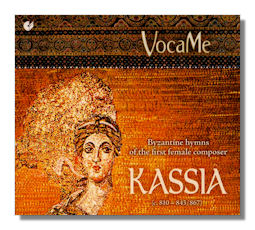
The Internet's Premier Classical Music Source
Related Links
- Latest Reviews
- More Reviews
-
By Composer
-
Collections
DVD & Blu-ray
Books
Concert Reviews
Articles/Interviews
Software
Audio
Search Amazon
Recommended Links
Site News
 CD Review
CD Review
Kassia

Byzantine hymns of the first female composer of the Occident
- Doxazomen sou Christe (Wir preisen, Christus)
- Ek rizis agathis (Aus guter Wurzel)
- O synapostatis tyrannos (Der mitabtrünnige Tyrann)
- O Phariseos (Der Pharisäer)
- O vasilevs tis doxis Christos (Der König der Ehre, Christus)
- I Edessa (Edessa)
- Tin pentachordon lyran (Die fünfsaitige Lyra)
- Igapisas theophore (Du entbranntest, Gottesträger)
- Yper ton Ellinon (Der heidnischen Bildung)
- I en polles armaties (Die vielen Sünden verfallene Frau)
- Pelagia (Pelagia)
- Tou stavrou sou i dynamis
- Olvon lipousa patrikon (Den väterlichen Wohlstand zurücklassend)
- Petron ke Pavlon (Petrus und Paulus)
- Isaïou nyn tou prophitou (Des Propheten Jesaja)
- I ton lipsanon sou thiki (Das Grab deines Leichnams)
- Avgoustou monarchisantos (Augustus, der Monarch)
- Christina martys (Die Märtyrerin Christina)
VocaMe/Michael Popp
Christophorus CHR77308
From what little we know, Kassia was a brilliant and well-educated women born around 810 CE in Constantinople. Among her other achievements, Kassia (or Kasia, Eikasia, Ikasia, Kassiane etc… several variant spellings are found) was a remarkable composer of Eastern chant. Certainly the first whose work has survived. The tradition in which such women worked has its origins at least in Ancient Greece, and probably even Egypt. The heterai and "melic" poets of whom the most celebrated was Sappho are in the same tradition. Although we know of the existence of such artists, little or no music by them is extant until fragments from the fourteenth century. Other than the 50 compositions of Kassia, that is – a dozen and a half or so of which are performed here exquisitely and with an unadorned yet powerful directness (surely what's called for) by the eight-person German group, VocaMe.
In the world and at the time in which Kassia worked, the music was considered subservient to the texts, whose purpose was didactic – in a liturgical context. While respecting such origins, VocaMe have accorded due prominence to the melodies and harmonies, many of which – particularly in terms of the instrumentation – are necessarily speculative. This performance does not have the roughness of similar very early music when performed by, for example, Ensemble Organum; nor is it in any way saccharin and thus inauthentic. The balance which director Michael Popp has achieved is both convincing and suitable for what we know of this music's origins.
The use of instruments provides variety, as does the choice of works. Some will surprise, being entirely figurative and metaphorical. Others are more commonplace paeans of praise. Others rhetorical and exhortative. The majority here can be categorized as Stichera – hymns in particular celebration of a saint or feast occasion. Notated in Medieval Neumes as monophonic chant, drones and the Isokratema or "undervoice" were known to have been used in performance. Most of Kassia's hymns were in the Deuteros and Tetartos modes. VocaMe has clearly absorbed such procedures and idioms. They make the music immediate and highly communicative: it's almost unnecessary to know that Kassia's music was more widely prized than much of that of her (male) contemporaries for their greater originality and deeper imagination. What is made plain, what would be hard to ignore in this recording, is the composer's wit and sometimes acerbic stance towards those she disparaged or of whom she disapproved.
It is the beauty and clarity of the singing by VocaMe that will perhaps leave the most lasting impression, though. This is lovely music, if not traditionally "visionary". And the singers have invested in it a sense of presence and dedication that is nevertheless unselfconscious and approachable. They have arrived at just the right blend of personality (in individual singing styles, for example) and projection of the music as simple yet powerful music to make this CD something special and well worth investigating.
The acoustic is appropriately reverberant, although the quality and purity of the soprano, mezzo and alto voices of VocaMe do not need "effects". Since it has become the norm to suggest antiquity and remoteness this way, we should accept it. After all, it's likely that such music was originally performed in large spaces – churches, basilicas. The notes in the booklet, which is bound into the "digipak", contain complete texts (in Greek, and English and German translations) with a short background on each. They also concentrate more on Kassia's eventful life; and explain that it's thought she turned to music after being spurned by the emperor Theophilos in May 830. Like Hildegard of Bingen almost 300 years later, Kassia was abbess of her own nunnery, which was destroyed by the Turkish government in the twentieth century. Also like Hildegard, Kassia devoted the rest of her short life to writings which included philosophy and literature. It would be a mistake to put Kassia (or this welcome CD) in the "curiosity" category: this is moving and beautiful music. It almost goes without saying that there is no other recording of her music to speak of. Even were it not for her historical and political significance as a feminist and artist, the music on this CD, although lasting less than 45 minutes, deserves to be listened to on its own terms and indeed to be much better known.
Copyright © 2010, Mark Sealey.



















